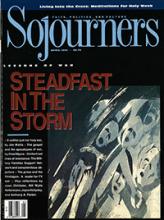I recall a most memorable night in the Washington National Cathedral just six weeks ago. Sojourners and the cathedral had called for a prayer service and candlelight march to the White House on the eve of the U.N. deadline for Iraq to withdraw from Kuwait. On that Monday night, January 14, American public opinion on whether to go to war was about evenly split. I even remember hearing people say that this might be the first time in history that popular opinion would stop a war before it started.
We hoped for a good turnout, perhaps as many as 2,000 people. But when I saw the gathered crowd, I could scarcely believe my eyes. The seventh largest cathedral in the world was the fullest it had ever been -- so full that the fire marshal had to close the doors.
More than 7,000 anxious but hopeful people filled every available space, and 1,500 more listened to the service piped through speakers outside. Then our seemingly endless stream of candlelight flowed through the dark city, past the Iraqi Embassy, and on to 1600 Pennsylvania Avenue, where we were enthusiastically greeted by 2,000 more people.
From the White House, the flickering candles moved on to Metropolitan AME Church, where we held an all-night prayer vigil. It seemed, that night, that the whole city was glowing in fervent and urgent prayers for peace. The call for an alternative to war had struck a deep nerve in Washington, DC.
That night now seems like an eternity ago. Two days later, the war began. The polls shifted dramatically, mostly, I believe, out of support for the troops; most people found it difficult to separate support for them from support for the war policy. But there was another critical factor in public perception. The war became an instant "success." And success wiped away all questions.
Read the Full Article

